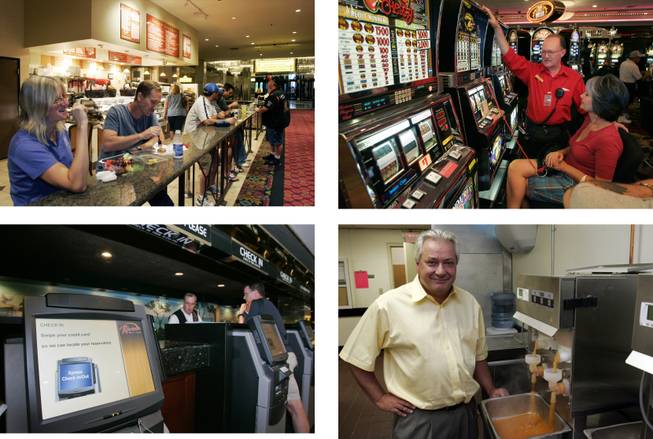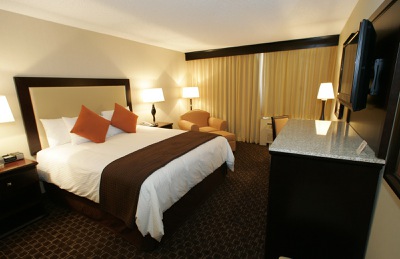
Clockwise from top left: Conventioneers at the Riviera have a light meal at a new snack bar, which replaced temporary food tables the hotel used to use for serving conventions. Riviera customer service representative Hal Doyle chats with Lisa Hopkins of Spavinaw, Okla., after she hit a big jackpot on a slot machine. Lloyd Wentzell, the Riviera’s food and beverage vice president, shows the Quick Cuisine machines used to make sauces and other food for the hotel’s restaurants. Self-service kiosks let hotel guests check in and out quickly. Kiosks are among the cost-cutting moves the aging Strip property is employing during the downturn.
Monday, Sept. 8, 2008 | 2 a.m.
When times are flush, managers think big: Budgets balloon, plans take shape and perks flow. When times are tough, as they are now for casinos on the Strip, they’re thinking small, combing budgets, reviewing expenses and trimming where they can.
Properties such as the Riviera have had to get even more creative. The efforts at the resort — which is owned by Riviera Holdings Corp., a small publicly traded company that makes about 75 percent of its revenue from its Strip casino — provide a window on how Las Vegas casinos are coping during tough economic times.
The company had a breakout year in 2007. Revenue rose 2 percent compared with the prior year. Earnings before interest, taxes, depreciation and amortization, a key measure in the casino industry, jumped 7 percent and profit margins rose a percentage point. Management was applauding a job well done at a property that emerged from bankruptcy in 1993.
This year, when the Riviera’s posh neighbors on the Strip began to slash room rates to levels not seen in decades, the Riviera had less to give away than its deep-pocketed competitors, yet still needed to get heads in beds.
While luxury hotels offered rooms for $100, the Riviera offered rates as low as $65.
For the first half of the year, revenue across the company fell 10 percent. During the latest quarter, which ended June 30, casino revenue plummeted 17 percent from a year ago, room revenue fell 11 percent and food and beverage revenue declined 14 percent.
“We went from our best year to some of the worst months in 20 years,” Riviera Holdings Chief Financial Officer Phil Simons said.
As the downturn deepened, pencils were sharpened and belts were tightened. With interest owed on $225 million in loans, yearly revenue of less than $210 million and a property past its prime, the Riviera is a study in micromanagement.
“We went through every expense, line by line, and asked whether it was necessary, whether it was adding value to the business,” Simons said.
“Today everything is on a need-to-buy basis rather than a lets-try-this-out basis,” added Riviera Las Vegas President and Chief Operating Officer Bob Vannucci.
With five hotel towers cobbled together since its 1955 debut and hallways lined with retail shops selling fuzzy dice and trucker hats, the Riviera, despite some $300 million in improvements over 15 years, still looks worn.
And yet, much of the property is new, including a recently remodeled casino with new carpeting and paint as well as a $150,000 pool deck.
Before the downturn, the company began what turned out to be a poorly timed remodel of its 2,075 rooms.
The biggest bucks went into its 979-room Monaco tower, whose rooms compare with those of upscale mid-tier properties on the Strip, featuring swank furniture and modern bathroom fixtures. Standard rooms also got a makeover, with pillow-top mattresses and European bedding, ottomans, granite counter tops, flat-screen TVs and radios with iPod docking stations.
The $23 million remodeling, the first in seven years, has generated disappointing returns because the rooms became ready during a downturn. But management is hopeful rates will rebound next year or even more strongly in 2010, as major resorts open nearby.
The property is reaping more immediate profits in Crazy Leroy’s, a new, Strip-facing sports book with sofa chairs and an attached deli. The casino is marketing the venue to locals as a place to eat and gamble that also allows smoking, unlike bars and even casino restaurants after a partial smoking ban in Las Vegas.
The company also installed electronic kiosks at its hotel check-in area similar to those offered in airports. The kiosks accept credit cards and spit out room keys, receipts and coupons. They speed up the process of checking customers in and out, saving on labor costs. About 60 percent of customers are using the kiosks, though many customers, particularly older guests, are asking hotel employees to assist them with the kiosks, Vannucci said.
As the company looked to cut costs, it lowered accounting fees by changing auditing firms and reduced bank fees by consolidating the number of banks used for everything from corporate checking accounts to investment accounts and casino money handling.
The Riviera has also cut back on internal entertainment expenses, such as wining and dining vendors. And it has combined purchases with its sister property, negotiating lower rates with vendors and consolidating suppliers.
Company perks were scrutinized as well. Management cut back on magazine subscriptions, company cell phones and BlackBerrys.
In a more unusual move, the Riviera removed some slot machines from its floor. Though fewer customers result in less slot play, casinos rarely remove machines that are bought and paid for. The Riviera, however, saw a twofold benefit from reducing labor and maintenance costs on roughly 900 machines — fewer than are offered in many big locals casinos — and widening aisles for players, predominantly older customers, who wanted more breathing room.
“We looked at every slot machine on the floor relative to the average (revenue per machine) and took out what wasn’t performing,” Vannucci said. “We reconfigured the entire floor.”
The company has reduced hours at several restaurants and will only serve a dinner buffet if the hotel is especially busy.
Like most casino companies, the Riviera has also laid off some workers.
In tandem with the layoffs, slot floor workers were retrained to handle tasks that were previously the job of multiple people. Slot floor people, now called “customer service representatives,” can make change, hand pay big jackpots, fix ticket jams and other minor technical problems and even grant comps to players.
The most important aspect of the new jobs, says 12-year Riviera employee Hal Doyle, is taking time to chat up customers.
That wasn’t possible in years past, he says. Like other Strip casinos, the Riviera has replaced coin-operated machines with ticket machines. Although many change workers were laid off as a result, the new machines have freed up more time for the remaining employees because they are much easier to maintain, Doyle said.
Being helpful and chatty makes the job more gratifying and helps the bottom line, he said.
“We don’t have volcanoes or roller coasters. We have people like me. We have to treat people special, even if you’re only playing a few pennies at a time.”
If the Riviera had a secret weapon in its fight to cut costs, it would be a machine the size of a self-serve soda fountain. In the depths of a commercial kitchen on the property are a pair of Quick Cuisine machines that can create and dispense sauces of varying thicknesses and serving sizes, including gravy for a turkey sandwich, spicy tomato sauce for a platter of spaghetti and industrial-sized servings of eggs and oatmeal. Using a process similar to freeze-drying, the manufacturer reduces homemade foods to powders that are reconstituted when they’re mixed with water heated to more than 200 degrees.
The Riviera installed the machines about three months ago, becoming the first hotel in Las Vegas and among only a few in the West to try the technology, developed by the U.S. military to feed troops. The machines will pay for themselves by eliminating wasted food, speeding up food production and ensuring consistency, executives say.
“We’re really looking under every rock,” Vannucci said. “This is when management really earns their bucks. When times are good anyone can be a superstar.”


Join the Discussion:
Check this out for a full explanation of our conversion to the LiveFyre commenting system and instructions on how to sign up for an account.
Full comments policy